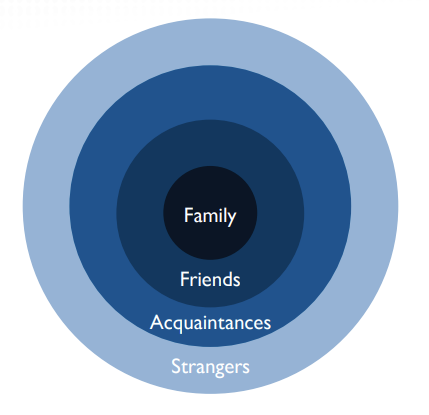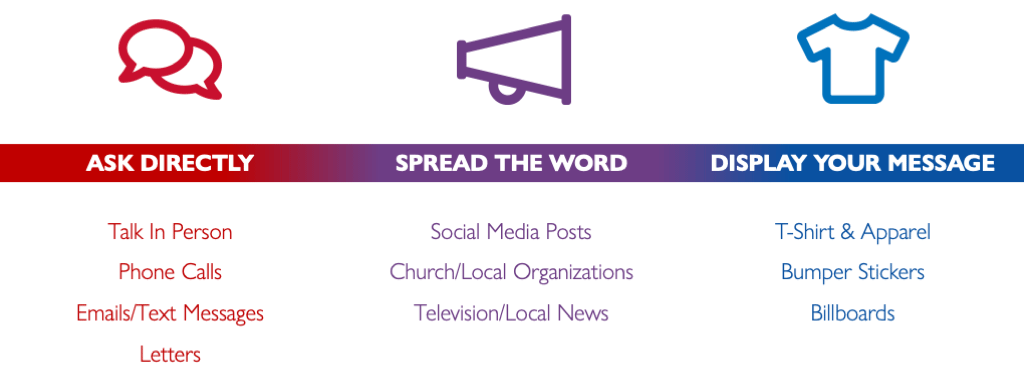Running a Successful Kidney Donor Search
The biggest obstacle to finding a living kidney donor is simply not knowing how to look for one and not knowing how to ask people to consider becoming a donor. We can help you with the process, from assembling your search team to telling your story to what to say to potential donors.
Your Donor Search Team
Searching for a living kidney donor requires a great deal of work, and you will need help in your search so you can focus on your mental and physical health prior to transplant. Ideally, you would have a team to help you through this process, with the roles and duties as shown below. If you do not have that many people able or willing to help, don’t be discouraged; one person can fill multiple roles and the patient can as well.
| Role | Function |
|---|---|
| Patient | Stay as healthy as possible and maintain a positive attitude. |
| Caregiver | Drive patient to medical appointments, manage medications, monitors diet, etc. |
| Admin | Manage insurance matters, organize medical records, etc. |
| Champion | Get the word out, find potential donors. |
| Coach | Motivate and advise the patient. |
What Do You Say to Potential Donors?

Asking someone to donate a kidney can be uncomfortable, but most people will be willing to at least listen to your request if asked in the right way. Here’s what to say to people in the different levels of your circle of influence.
- Family Members: “Would you be willing to be tested to see if you are medically qualified to donate?”
- Friends: “I’m asking all my friends whether they are willing to be tested to see if they are medically qualified to donate. Is that something you would consider?”
- Acquaintances: “I am looking for a kidney donor. Do you know anybody who may be willing to be tested to see if they are medically qualified to donate?”
- Strangers: “I am looking for a kidney donor. Can you help me find a living donor by sharing my story?”
How to Discuss Your Need for a Kidney Donor
There are many ways to reach potential donors, from personal one-on-one interactions to public outlets that have the potential to reach hundreds, or even thousands of potential donors. Here are some ways to get the message out.

Don’t reinvent the wheel! If you have a friend who only responds to you if you text them, text that friend, don’t start out with a call. If the only way to reach your cousin is by emailing her, email her. You know how best to communicate with those in your life, the important thing is that you do reach out to them and discuss your need.
Donor Search Tips
Find A Kidney is run by living kidney donors and transplant recipients who know what it takes to find a living kidney donor. Here are some of the things we’ve learned through hundreds of successful kidney donor searches:
- Potential champions should have a clear reason why they can’t donate, since this is one of the first questions a potential donor will think about when approached by a champion.
- Never say you have a donor until the surgery is done. Things happen, medical issues occur, donors back out, and surgery can be cancelled. Saying you have a donor prematurely will turn away other potential donors.
- Don’t try to talk someone into donating. If someone says no, their mind is made up. Thank them for listening and move on to other potential donors.
- Anyone could be a potential donor, so don’t rule people out.
- Let the transplant center worry about medical suitability.
- Many donor support options are available, such as reimbursement for lost wages, travel and dependent care. Tell potential donors about Donor Shield.
- Donor-recipient incompatibility is no longer an issue. With the NKR, over 90% of incompatible pair transplants take place in under six months, with a median wait time of 1.6 months. Tell potential donors about the Voucher Program.
The Next Step in Your Kidney Search
When you’re ready to take your kidney donor search to the next level, Find A Kidney offers access to donor search coaches to help you navigate your search and create a personal microsite, which is a free personal website designed to help patients find a living donor.
